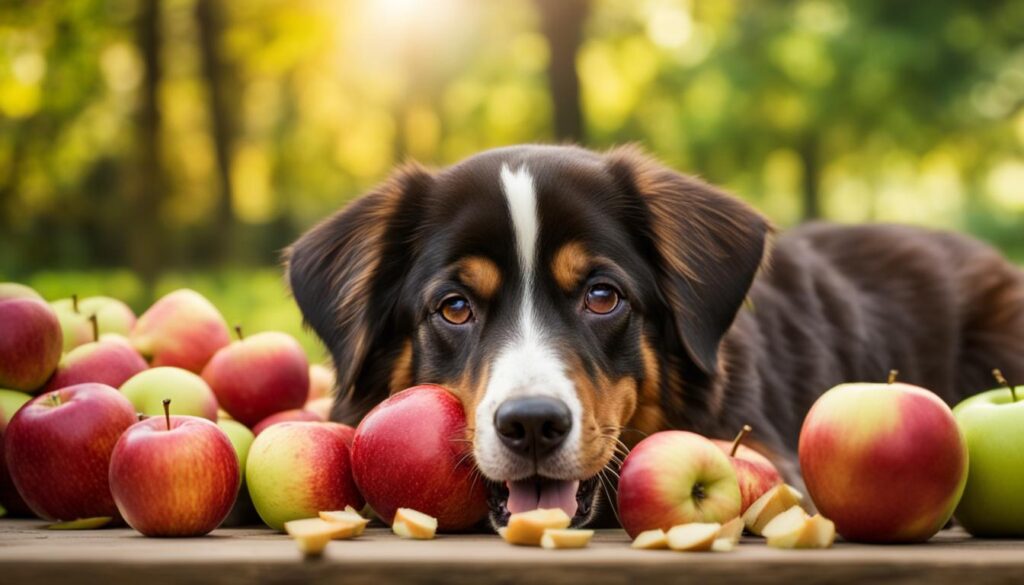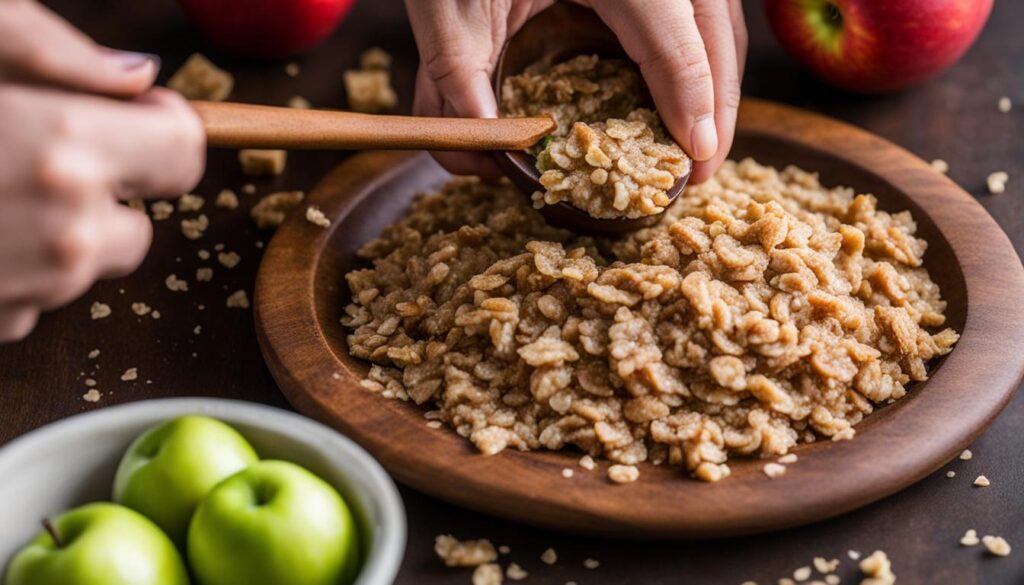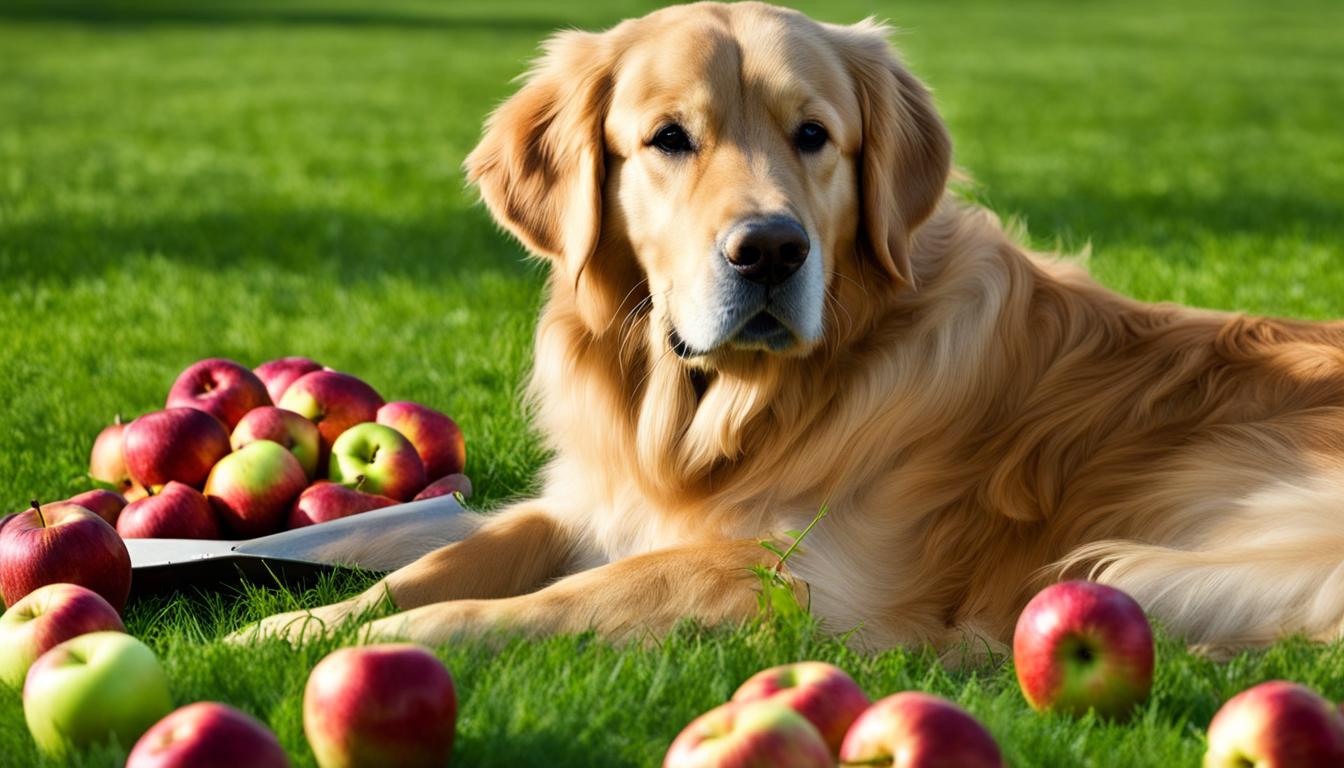Are you curious about whether or not your furry friend can munch on apples? Well, you’ll be pleased to know that dogs can indeed indulge in this fruity treat! Apples can offer a range of health benefits for dogs, but there are also some precautions to keep in mind. Let’s explore the nutritious advantages of apples for dogs and the necessary steps to ensure their safety.
Key Takeaways:
- Apples are rich in essential nutrients such as vitamins A, C, and K, as well as minerals like zinc and iron.
- Feeding apples to dogs can strengthen their immune system, improve digestion, and help prevent certain diseases.
- Remove apple seeds and cores as they contain cyanide, which is toxic to dogs.
- Large amounts of apples or apple skins can cause digestive upset, so moderation is key.
- Consider peeling the apples to prevent choking hazards and be cautious of underlying health conditions, such as diabetes.
Are Apples Good for Dogs? Nutritional Benefits and Safety
When it comes to dogs, apples are not only a tasty treat but also offer numerous nutritional benefits. They are packed with essential vitamins, minerals, and dietary fiber that can contribute to your dog’s overall health and well-being. Apples contain vitamins A, C, and K, which are vital for a strong immune system. The high fiber content supports healthy digestion, while the natural antioxidants help combat free radicals and reduce the risk of certain diseases.
Feeding your dog applesauce or frozen apples can be a safe and enjoyable option. However, it’s crucial to ensure that these products do not contain any added sugars or artificial sweeteners, like xylitol, which can be toxic to dogs. Always read the labels carefully to make sure you’re providing your furry friend with a safe and healthy treat.
While apples are generally considered safe for dogs, there are a few precautions to keep in mind. It’s important to remove the apple seeds and core before feeding them to your dog, as they contain a compound called cyanide, which can be harmful. Additionally, feeding large amounts of apples or apple skins can lead to digestive upset, so it’s best to introduce them gradually and in moderation.

To summarize, apples can be a nutritious addition to your dog’s diet, providing them with important vitamins, minerals, and fiber. However, it’s essential to remove seeds and cores, and to start with small portions to avoid any digestive issues. Always prioritize your dog’s safety and consult with your veterinarian if you have any concerns or questions.
Preparing and Serving Apples to Dogs: Tips and Homemade Treats
If you’re considering adding apples to your dog’s diet, it’s important to know how to prepare and serve them safely. Here are some tips to keep in mind:
- Start by washing and scrubbing the apples to remove any pesticide residue. This will ensure that your dog is consuming a clean and safe fruit.
- Peel the skin off the apples before feeding them to your dog. While the skin contains some nutrients, it can also pose a choking hazard, especially for smaller breeds.
- Cut the apples into thin slices or small cubes to make them easier for your dog to chew and swallow. This will help prevent any digestion issues.
Now, let’s move on to the fun part – homemade apple dog treats! These treats are a great way to incorporate apples into your dog’s diet while adding a touch of variety to their snack time. Here’s a simple recipe to get you started:
“Apple Cinnamon Dog Biscuits”
Makes approximately 20 biscuits
Ingredients:
- 1 cup oat flour
- 1/2 cup unsweetened applesauce
- 1/4 cup unsweetened apple juice
- 1/4 cup finely chopped apple
- 1 teaspoon ground cinnamon
Instructions:
- Preheat your oven to 350°F (175°C) and line a baking sheet with parchment paper.
- In a bowl, mix together the oat flour, applesauce, apple juice, chopped apple, and cinnamon until well combined.
- Roll out the dough on a lightly floured surface to your desired thickness. Use cookie cutters to cut out shapes or simply use a knife to cut squares or rectangles.
- Place the biscuits on the prepared baking sheet and bake for 20-25 minutes, or until they are golden brown.
- Allow the biscuits to cool completely before serving them to your furry friend.
These homemade apple cinnamon dog biscuits are sure to be a hit with your pup! Just remember to serve them in moderation as part of a balanced diet.
Serving Apple Chips to Dogs
While apple chips may seem like a tempting treat for your dog, it’s important to exercise caution. Many commercially available apple chips are loaded with added sugars and preservatives, which can be harmful to your furry friend. If you’d like to give your dog apple chips, it’s best to make them at home.
To make your own healthy apple chips, simply slice the apples into thin rounds and remove the seeds and cores. Lay the slices on a parchment-lined baking sheet and bake them at a low temperature (around 200°F or 95°C) for 1-2 hours, or until they are crispy. This homemade alternative ensures that your dog is enjoying a wholesome and natural snack.
Remember, while apples can be a nutritious addition to your dog’s diet, it’s essential to consult with your veterinarian before making any significant changes to their food routine. They’ll be able to provide personalized advice and guidance based on your dog’s specific needs and health conditions.

Potential Risks and Allergies When Feeding Dogs Apples
While apples can be a healthy and nutritious snack for dogs, there are potential risks to be aware of. One of the main dangers of feeding apples to dogs is the presence of apple seeds. Apple seeds contain cyanide, which is toxic to dogs if consumed in large quantities.
Additionally, apple cores can pose a choking hazard or cause gastrointestinal blockages if swallowed by dogs. It’s crucial to remove the seeds and cores before feeding apples to your furry friend to ensure their safety.
Another important consideration when feeding dogs apples is the potential for allergies. Just like humans, some dogs may be allergic to apples. Allergic reactions can manifest as sneezing, coughing, swelling, or skin irritations. If you notice any unusual reactions after feeding your dog apples, it’s essential to consult with your veterinarian for guidance.
Table: Potential Risks and Precautions When Feeding Dogs Apples
| Potential Risks | Precautions |
|---|---|
| Dangers of apple seeds | Remove apple seeds before feeding apples to dogs |
| Choking hazard from apple cores | Always remove apple cores before giving apples to dogs |
| Allergies to apples | Monitor your dog for any signs of allergic reactions and consult with a veterinarian if necessary |

It’s important to remember that while apples can provide health benefits to dogs, they should always be fed in moderation and prepared properly. Remove the seeds and cores, and monitor your dog for any adverse reactions. Prioritize your dog’s safety and consult with a veterinarian if you have any concerns.
Conclusion
In conclusion, apples can be a delicious and nutritious addition to your dog’s diet when fed in moderation and prepared properly. They offer a range of vitamins and minerals that can support your dog’s overall health and well-being.
However, it’s essential to be mindful of a few precautions. Always remove the apple seeds and cores, as they contain cyanide, which can be toxic to dogs. Additionally, large amounts of apples or apple skins can cause digestive upset, so it’s crucial to feed them in moderation.
When serving apples to your dog, make sure to wash and peel them to remove any residue or choking hazards. You can cut them into small slices or cubes to make them easier to chew and swallow. And if you’re looking to treat your furry friend, consider making homemade apple treats with minimal added sugars and artificial ingredients.
If your dog shows any unusual reactions to apples or experiences digestive issues, it’s always a good idea to consult with your veterinarian for further guidance. Remember, every dog is unique, and what works for one may not work for another.
So, the next time you’re enjoying a crisp apple snack, feel free to share a slice with your furry companion. Just remember to keep it moderate, safe, and enjoyable!
FAQ
Can dogs eat apples?
Yes, dogs can eat apples as part of a balanced diet.
What are the health benefits of apples for dogs?
Apples are rich in essential nutrients such as vitamins A, C, and K, as well as minerals like zinc and iron. They can help strengthen the immune system, improve digestion, and prevent the development of certain diseases.
What precautions should I take when feeding apples to dogs?
It is important to remove apple seeds and cores as they contain cyanide, which is toxic to dogs. Large amounts of apples or apple skins can cause digestive upset, so moderation is key. Peeling the apples can also prevent choking hazards, and it’s important to consider any underlying health conditions your dog may have, such as diabetes.
Are apples good for dogs?
Yes, apples can be a nutritious snack for dogs, providing them with vitamins, minerals, and dietary fiber. They can support the immune system, promote gastrointestinal health, and help maintain healthy teeth and gums.
Can dogs eat applesauce and frozen apples?
Yes, dogs can also consume applesauce and frozen apples. Just make sure they are free from added sugars or artificial sweeteners like xylitol.
How should I prepare and serve apples to dogs?
Wash and scrub the apples to remove any pesticide residue. Peel the skin to prevent choking hazards and increase fiber intake. Cut the apples into thin slices or small cubes to ensure they are easy to chew and swallow.
Can dogs have apple chips?
It is best to avoid giving dogs commercially flavored apple chips, as they may contain added sugars or artificial ingredients. Instead, consider making homemade treats such as apple peanut butter cookies or roasted apple chips.
What are the potential risks and allergies when feeding dogs apples?
Apple seeds contain cyanide and should be avoided, as consumption in large quantities can be harmful. Apple cores can also pose a choking hazard or cause gastrointestinal blockages. Additionally, some dogs may be allergic to apples, which can lead to allergic reactions such as sneezing, coughing, or swelling.
Can dogs eat apples conclusion?
Apples can be a healthy and nutritious addition to your dog’s diet when fed in moderation and prepared correctly. However, it’s important to be aware of potential risks, remove seeds and cores, and monitor your dog for any adverse reactions. If in doubt, consult with your veterinarian.





